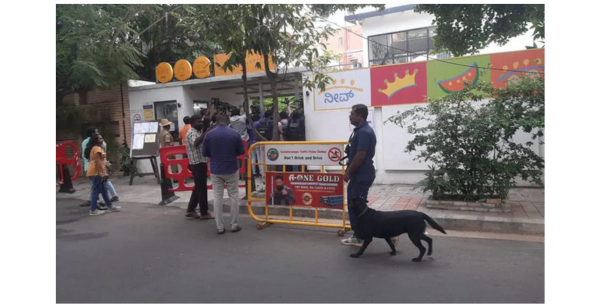Bengaluru Bomb Threat Hoax: Panic as 40 Schools Receive Threatening Emails

BENGALURU, July 18, 2025 — Bengaluru was shaken on Friday morning when nearly 40 private schools across the city received bomb threat emails, sending students, parents, and authorities into panic. The threatening messages claimed TNT explosives were planted on school campuses, triggering emergency evacuations and a full-scale security response.
What Triggered the Panic?
The emails were reportedly sent from anonymous email addresses like roadkill333@atomicmail.io, containing terrifying language. The message claimed that explosives were hidden in plastic bags and chillingly warned, “Not a single soul will survive.”
Within minutes, schools in Rajajinagar, Whitefield, Kengeri, RR Nagar, and other areas reported receiving similar threats. As fear gripped the city, schools quickly initiated lockdowns and evacuation procedures, prioritizing student safety.
Swift Action by Police and Emergency Teams
The Karnataka Police, along with bomb squads and canine units, rushed to the affected schools. Emergency protocols were activated, and children were evacuated to safe zones. Authorities conducted thorough checks of school premises.

Fortunately, no bombs or suspicious items were found at any location.
Bengaluru Police Commissioner addressed the media saying:
“All students are safe. No explosives were recovered. We are taking these threats seriously and investigating the source of these emails.”
Growing Pattern: Not the First Time
This is not an isolated case. Just a few days earlier, over 45 schools in Delhi received similar bomb threats via email. Similar incidents were also reported in Vadodara and Tamil Nadu earlier this year.
The pattern of the messages, the use of similar email IDs, and identical threats suggest this could be part of a coordinated cyber hoax campaign, possibly inspired by previous incidents.
Cyber Crime Division Steps In
The case is now under investigation by the Cyber Crime Division. Authorities believe the perpetrators used:
- VPNs to hide IP addresses
- Encrypted email platforms like Atomicmail or Beeble
- Spoofed identities to avoid being traced
A senior official noted:
“We are analyzing the metadata, routing paths, and domain sources. It’s a complex case that may involve actors from India or abroad.”
Emotional Impact on Students and Parents
Although no physical harm occurred, the emotional toll was heavy. Children were seen crying and confused during evacuations. Many parents rushed to schools, creating panic and chaos outside school gates.
Educational psychologists warned that repeated exposure to such threats can cause long-term trauma, especially among younger children. Schools have been advised to arrange counseling sessions and provide emotional support to affected students.
Safety Measures Being Implemented
Following the scare, several schools across Bengaluru have begun tightening their security systems. Key measures being considered include:
- Emergency drills for students and staff
- Installation of metal detectors and surveillance systems
- Improved communication systems between schools and local police
- Advanced email filters to block threatening or suspicious messages
These steps are intended to ensure that future threats can be managed more calmly and efficiently.

What Parents Should Know and Do
Parents play a key role in managing fear and misinformation. Here’s how they can help:
- Trust official updates from school authorities or law enforcement.
- Avoid forwarding unverified messages on WhatsApp or social media.
- Talk to children about safety in a calm and reassuring manner.
- Understand school protocols and support safety initiatives.
Spreading rumors or panicking can make the situation worse. Awareness and cooperation are crucial.
Long-Term Solutions for School Safety
Experts believe that such hoaxes highlight a major gap in school security and cyber awareness. They recommend:
- Creating threat-assessment teams at the school and district levels.
- Conducting annual audits of security measures in all educational institutions.
- Providing digital safety training to students, parents, and staff.
- Investing in cyber surveillance tools to monitor and filter suspicious digital activities.
There is also a growing call for stronger cyber laws to penalize those who create mass panic through digital threats.
Conclusion: A Wake-Up Call for Educational Institutions
The July 18 Bengaluru bomb scare may have turned out to be a hoax, but its impact was very real. It disrupted daily life, affected mental health, and exposed weaknesses in school safety and cyber vigilance.
As cybercrime becomes more sophisticated, schools must move beyond traditional safety models. Preparedness, rapid communication, and emotional support must become integral parts of school policies.
For now, parents can breathe a sigh of relief. But this incident must act as a turning point—not just for Bengaluru, but for schools across India.


